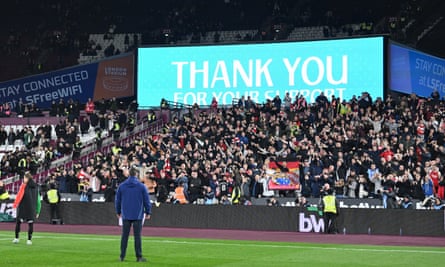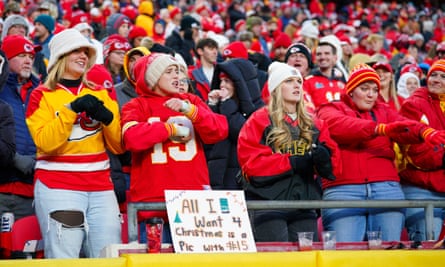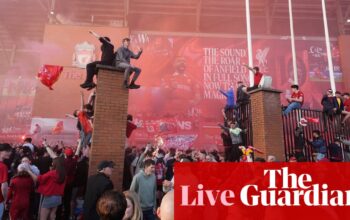For West Ham supporters it was a sense of values betrayed. “The club should be ashamed that things have come to this,” said Michael, a supporter for 80 years, as he became the 20,000th signatory on a petition calling for the club to maintain all concessionary ticketing. For Spurs fans, a similar shock boiled down to a crystalised slogan – “Save our seniors” – and a pushback on plans related to reduced ticket prices. This month Manchester United supporters took to the streets to protest against concession cuts and price rises. As one banner put it: “Local lad Sir Jim charges £66 for OAPs and juniors. Stop exploiting loyalty.”
At a time when the Premier League is cementing its dominance as the world’s biggest domestic football league, securing a 17% increase in TV rights over the next three-year cycle while their rivals stand still, a spate of seemingly mindless penny-pinching has sparked dissent. The mood, involving supporters up and down the country, is one that hasn’t been seen since the Super League blew up.
“I’ve said it casually to friends that this is the most significant thing to happen to football fans since rave culture,” says Andy Payne, referring to the end of the 80s when “all the hooliganism went out overnight and everyone started hugging instead of punching each other”. Payne is the chair of Hammers United and sits on West Ham’s fan advisory board. He has been instrumental in bringing supporters together to push back against cuts in concessionary pricing and not just fans of his club either. “Both us and Spurs had got this issue of concessions and so we started campaigning,” he says. “For West Ham and Tottenham to do anything together is remarkable for me.”
Payne’s feelings are echoed by Chris Rumfitt of the Manchester United Supporters Trust, which formed a protest alliance with fans of Manchester City, Liverpool and Everton last weekend.
“Whilst fierce rivalries are the lifeblood of English football, on some issues all supporters need to stand together and this is one of them,” he says. “We all face the same challenge in terms of owners failing to recognise the value of fans to the overall ‘product’ and seeking to exploit that loyalty. It was great that Everton fans stood with us to do so.”
The reason for such outlandish shows of cross-club solidarity? A feeling that this latest round of increased prices goes beyond the customary squeezing of the loyal supporter and into something like antipathy. Season-ticket prices in the Premier League rose an average of 6.7% last summer, with Crystal Palace the only non-promoted club not to lift their prices. This was painful but not unusual for most supporters who were protesting against price rises last year and the years before. This year, however, the pain has notably been extended, to concessionary tickets which have traditionally been fixed at lower rates to help older, younger and fans with disabilities to attend matches.

“The campaign started at our end when, in a nutshell, they decided that old and young and disabled were going to be pensioned off,” Payne says. “It just seemed ridiculous. This was the lifeblood of the club, rewarding the loyalty of the old, encouraging loyalty of the young, and being civil and reasonable to disabled people who require loyalty too.”
Why would any club do this? According to United, who last month suddenly announced a mid-season end to concessions alongside a hike in ticket prices, it was a simple matter of balancing the books.
“As a club, we have been focused on cost saving to put us on a stronger financial footing,” the club said in a statement this week. “This means having to make very hard decisions, including a significant reduction in our staff numbers. It also means looking for opportunities to increase our revenues so we can continue to invest in football and infrastructure.”
Although United posted a £113.2m annual loss in its latest financial results and have profitability and sustainability rules to meet, it is the last sentence in United’s remarks that, for some, is the telling one. “Many clubs point to ticket prices not having changed for years despite high inflation,” says Dr Christina Philippou, associate professor in accounting and sport finance at the University of Portsmouth.
“Financial regulations are biting, too, and many clubs are trying to bring in more income rather than regulating their spending, at least in the short term. But it is clear we are seeing changes to match-day income strategy with a new focus, for example, on tourist fans. These supporters are seen as generating more money per visit because they go to a single match every few years, or even once in a lifetime, and spend on merchandise, food, drink and other matchday experiences while they are there.”
This is a model more in line with American sport, where match days are a bigger experience, the stadium is a source of revenue all week and, crucially, supporters do not travel around the country providing vocal support to their team. “They are tampering with traditions. Tampering, and for what?” Payne says. “The amount of money they will save would cover Danny Ings’s wages for a month.”
after newsletter promotion
It is notable too that not all Premier League clubs feel the only way is up for prices. This week Brentford announced a policy to subsidise away tickets for under-18s so they will pay no more than £10. Away fans will also benefit from reduced prices for kids at the Gtech Community Stadium.
The Gen10 scheme was described by the manager, Thomas Frank, as “a great initiative that is about the future of football”. Togetherness, he said, “with our fans, both home and away, is crucial to what we’re building here. We know that seeing us win a long way from home gives memories that last forever.”

Brentford may not be the No 1 destination for football tourists, but they are making a play for the match-going supporter with a view to the long term.
Other teams, such as Brighton or Wolves, who stepped back from an end to child concessions after fan protests, may end up taking a similar view. The fact that other clubs continue to undervalue raucous loyal support, and what that brings to performance and the success of the Premier League, may be something they come to regret. And for now, one consequence is a fan culture that is more activist and united than for a long time.
“I don’t imagine that these challenges are going to go away,” says Payne. “What’s encouraging is the age group of the people involved is now getting younger. People in their 20s and 30s who are trying to take their kids to the game, or going with their uncle or their grandma and they’re suddenly being affected and going: ‘What’s all this about?’ I see the age group changing and I see the network of inter-club cooperation building. They’re both to be welcomed. It’s not just a bunch of blokes dressed in black getting aerated about it. It’s completely across society.”
Source: theguardian.com


